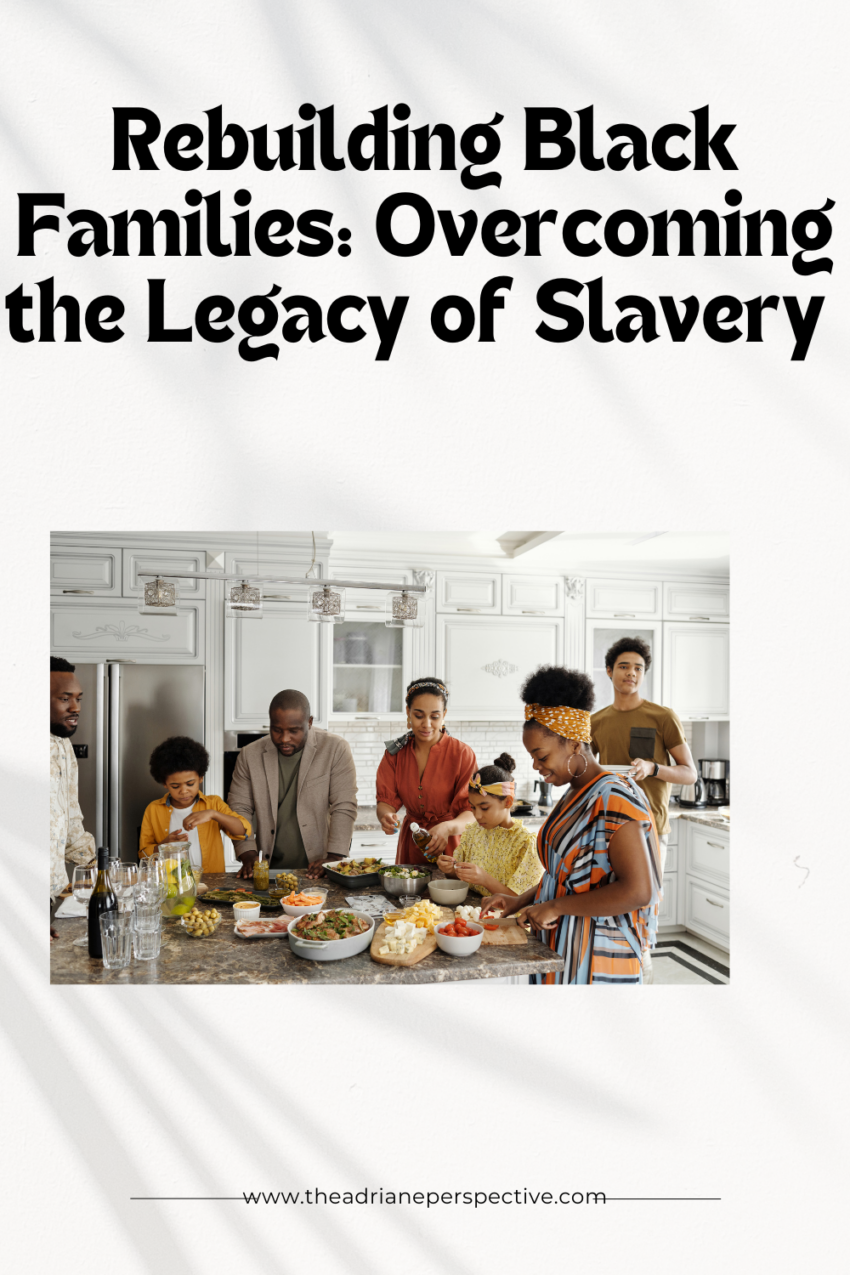Rebuilding Black Families: Overcoming the Legacy of Slavery
The impact of slavery on Black families has been profound, leaving a legacy of disrupted family structures, redefined gender roles, and generational trauma. Yet, through resilience, adaptability, and strength, Black families continue to thrive against the odds. To rebuild black families and move forward, we must acknowledge these historical challenges, reshape our collective mindset, and create actionable strategies for healing and growth.
Understanding the Legacy of Slavery on Black Families
The history of slavery profoundly influenced the dynamics within Black families, and its effects are still felt today. By understanding this history, we can better navigate the complexities of modern relationships and family structures.
1. Family Disruption and Separation
During slavery, families were often torn apart as individuals were sold, traded, or forcibly separated. It is estimated that 10-20% of slave marriages were destroyed by sale, with many children growing up without one or both parents. This systemic dismantling of family bonds placed immense strain on Black men and women, reshaping traditional family roles.
Today, the echoes of this disruption persist, influencing how Black families define and navigate relationships.
2. Fluid Gender Roles
The economic realities of slavery required both men and women to take on roles traditionally assigned to one gender. This adaptability showcased resilience but also led to tension in post-emancipation relationships, as families struggled to define roles in a society that continued to marginalize them.
3. Legal and Economic Exploitation
Laws like partus sequitur ventrem—which dictated that the status of a child followed that of the mother—turned Black women’s reproductive capabilities into commodities for slave owners. This dehumanization affected how Black women viewed their roles within families and how society perceived them.
4. Legacy of Distrust and Trauma
The trauma of slavery created a deep legacy of mistrust and communication challenges between Black men and women. Coupled with systemic racism, economic oppression, and societal stereotypes, these dynamics continue to complicate relationships and make it difficult to sustain strong familial bonds.
Reshaping Our Minds to Rebuild Black Families
Rebuilding Black families requires intentionality, healing, and unity. By addressing historical trauma and redefining family dynamics, we can create stronger, healthier relationships that uplift future generations.
1. Acknowledge and Heal from Historical Trauma
The first step in rebuilding is acknowledging the historical impact of slavery and systemic racism on Black families. Healing begins when we create spaces to openly discuss pain, resilience, and hope.
Action Step: Explore resources like books, documentaries, and workshops that address the history of Black families. Seek therapy or counseling with culturally competent professionals to gain tools for healing.
2. Redefine Gender Roles and Expectations
Rigid gender roles no longer serve the modern Black family. Instead, partnerships should focus on flexibility, mutual respect, and shared goals. Both men and women can thrive in collaborative family dynamics.
Action Step: Have open conversations with family members about shared responsibilities. Challenge traditional roles that no longer align with your family’s needs.
3. Rebuild Trust Through Open Communication
Mistrust, often rooted in historical trauma, has been a significant barrier in Black relationships. Rebuilding trust requires consistent, open, and honest communication.
Action Step: Practice active listening and create safe spaces for family members to express their feelings. Regular family meetings or check-ins can help resolve conflicts and strengthen bonds.
4. Strengthen Economic Foundations
Economic stability is essential for strong families. By addressing financial disparities and building generational wealth, Black families can create opportunities for lasting growth and security.
Action Step: Prioritize financial literacy through workshops, budgeting, and exploring entrepreneurship. Share knowledge and resources within your family to build collective wealth.
5. Embrace Vulnerability and Emotional Intimacy
The “strong Black woman” narrative and the pressure for Black men to suppress emotions have hindered vulnerability in relationships. Embracing emotional intimacy allows families to build deeper connections.
Action Step: Normalize emotional expression within your family. Encourage open discussions about mental health and seek support when needed.
6. Celebrate and Uplift Black Families
Representation matters. Celebrating the strength, beauty, and diversity of Black families inspires pride and motivates future generations to continue building strong bonds.
Action Step: Share positive stories of Black families in your community through social media, family gatherings, or local events. Highlight the resilience and unity that define Black families.
Moving Forward: A Vision for Rebuilding Black Families
Rebuilding Black families is a collective effort that requires healing, intentionality, and unity. By addressing the historical impacts of slavery, redefining roles, and fostering trust, we can lay the foundation for lasting strength and success.
This journey won’t be easy, but it is necessary. Together, we can honor the resilience of our ancestors and create a brighter future for generations to come.
Our families are the cornerstone of our communities, and rebuilding them is the first step toward collective liberation. Let’s move forward—together.
FAQs About Rebuilding Black Families
Q: How can I start conversations about historical trauma in my family?
A: Begin with shared resources, such as books or documentaries, and create safe spaces for open dialogue. Be patient and respectful as these discussions can bring up deep emotions.
Q: What are some tools to help build financial literacy in Black families?
A: Explore online resources, attend community financial workshops, and consider apps or tools designed to help with budgeting and investing.
Q: How can we balance traditional family roles with modern realities?
A: Focus on flexibility and collaboration. Discuss each family member’s strengths and how responsibilities can be shared to meet your collective goals.
By taking small, intentional steps, we can rebuild Black families and create a lasting legacy of strength and unity.

